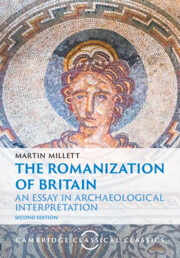Book contents
- Frontmatter
- Dedication
- Contents
- Illustrations
- Tables
- Foreword
- Preface
- Introduction: The Romanization of Britain in perspective
- 1 The Nature of Roman Imperialism
- 2 The Pattern of Later Iron Age Societies
- 3 The Invasion Strategy and Its Consequences
- 4 The Emergence of the ‘Civitates’
- 5 The Maturity of the ‘Civitates’
- 6 Development at The Periphery
- 7 The Developed Economy
- 8 Later Roman Rural Development
- 9 Epilogue: Decline and Fall?
- References
- Index
6 - Development at The Periphery
Published online by Cambridge University Press: 02 January 2025
- Frontmatter
- Dedication
- Contents
- Illustrations
- Tables
- Foreword
- Preface
- Introduction: The Romanization of Britain in perspective
- 1 The Nature of Roman Imperialism
- 2 The Pattern of Later Iron Age Societies
- 3 The Invasion Strategy and Its Consequences
- 4 The Emergence of the ‘Civitates’
- 5 The Maturity of the ‘Civitates’
- 6 Development at The Periphery
- 7 The Developed Economy
- 8 Later Roman Rural Development
- 9 Epilogue: Decline and Fall?
- References
- Index
Summary
By the end of the second century, although a backwater of the Empire, Britain had become a Romanized province. However, the whole Empire had also begun to alter in character and in the following century change accelerated and became more evident to contemporaries. As these processes intensified they were perceived as a crisis: the hitherto stable world was transformed rapidly and unpredictably, as the Golden Age of the second century was replaced by the anarchy of the third. The character of much of the archaeological evidence also develops into the pattern characteristic of the later Empire, although it is far from clear precisely how these alterations relate to those referred to in the historical sources. In this chapter the historical processes are outlined first to provide the background. The archaeological evidence is then discussed in relation to the historical changes defined.
Keywords
- Type
- Chapter
- Information
- The Romanization of BritainAn Essay in Archaeological Interpretation, pp. 127 - 156Publisher: Cambridge University PressPrint publication year: 2025

